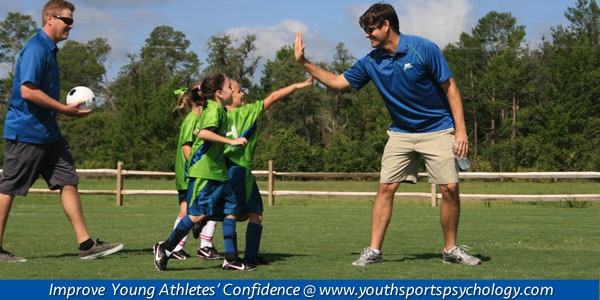Communicating With a Bully Coach
Sports parents often feel torn about how to deal with difficult or bully coaches. Parents worry that if they approach coaches about their behavior, the coaches will give their kids less playing time, bench them, or favor other players.
But parents need to overcome these fears and step forward. After all, coaches are only human. That’s what Kim, a sports mom, discovered after she took our advice and (bravely) reached out to a coach to discuss how he was undermining her 11-year-old baseball player’s confidence, and not realizing it.
In an interview, Kim told us that her son, a pitcher for his team, felt embarrassed when the coach degraded or yelled at him.
“The coach, as a way to motivate him, would embarrass him in front of his team mates,” says Kim. ‘The coach would yell at him, ‘It’s simple baseball boys, what’s wrong with you?’ He would pull him from the game and replace him, reducing him to tears.”
Her son responded the way most kids respond when humiliated. The boy’s confidence sunk and he stated to fear making mistakes.
“It deflated his confidence he was simply unable to perform. He was floundering, too afraid to make a decision or move. He was too intimidated to just go for it,” Kim says.
As we’ve said many times, when kids are too scared to take risks, their performance really suffers. They generally play to avoid making mistakes, which doesn’t allow them to grow as players.
In this case, it got so bad that Kim pulled her son from the team for three games of the season. But it didn’t feel good to Kim or to her son for him to walk away from a position of leadership, she says.
“We had to have some resolutions. We couldn’t just take our ball and go home,” she says.
That’s when Kim contacted us for advice, and we suggested she try to talk to the coach. Keep in mind that when we suggest this, we say that parents need to be careful about how they do this.
Parents should not approach coaches when they’re coaching, and they should not approach them in front of the players. Parents need to be civil and avoid blaming or insulting the coach.
That’s just what Kim did.
“I sent him an email. I thought this was the most innocuous, least confrontational way to approach him. I said, ‘As a coach, your job is to get the most out of your players.’”
She offered to explain to him how to get the most out of her son—by encouraging him and giving him positive feedback.
And guess what? The coach listened. He told Kim he had never coached kids this young before. He told her that it’s his job to understand what motivates each kid.
He said he had noticed that if he yelled, her son would shrink back. He even offered to work one-on-one in the park with Kim and her son on the skills the boy needed to improve. Kim accepted his offer.
When Kim’s son returned to the team—after meeting privately with the coach for a few weeks—he actually achieved a record number of strike-outs.
“Our first game back on the team – after myself, my son and the coach had met and had gotten through our problem – he struck out 10 players in a row – a record on our travel team. It was living, breathing proof that if you encourage my son and have a positive attitude, he will rise to the occasion,” she wrote us.
To listen to the first half of the interview with Kim, use the player below:
Related Articles on Youth Sports:
- College Sports and Bully Coaches: Rutgers’ Rice Fired
- Sports Mom Fights Bully Coach and Changes the System
- Should Parents Try to Reason with Bully Coaches?
*Subscribe to The Sports Psychology Podcast on iTunes
*Subscribe to The Sports Psychology Podcast on Spotify
Help Young Athletes Boost Confidence in Sports!
Every day, we receive letters from parents like you who want their children and teens to excel in sports. However, these parents can see fear, doubt, and frustration on the faces of their kids who struggle with the “inner” game of sports. But these parents have no idea how to help their kids overcome the worries, expectations and self-defeating thoughts that prevent their young athletes from feeling confident and successful.
You can benefit from our 15-plus years’ of work in sports psychology and sports parenting research. Now, you can tap into our secrets to sports success through a cutting-edge, 14-day program that helps young athletes overcome the top “mental game” challenges that sports parents face—and the top challenges young athletes face.



Hi Lisa,
While I am not sure this is the success story appropriate for this section, I believe our efforts were a HUGE success.
I posted on this site in the late summer, detailing my son’s journey with an abusive swim coach. My son was a talented, top rated swimmer in the state of Indiana. For his own self preservation, my son left the sport of swimming. Once he was able to communicate with us, his parents, the circumstances of the abuse and bullying we encouraged him to tell his story, establish a goal, and go after it. Our son told us he just didn’t want this to happen to another athlete. As his parents, we defined a path forward and supported our son while he told his story.
We went to the school and swim club board. These organizations chose to ignore and isolate our son and family. We then took our story to the governing organization for swimming, USA Swimming. We met with the Sports Development Director for Indiana and our son told his story to this individual. We also contacted the Athlete Protection Officer at USA Swimming and sent supporting documentation of our son’s situation. This organization declined to take action because they had nothing in place to define the coaches actions as harmful. At this time, the swim coach served us, through a lawyer, a letter suggesting an impending law suit. We engaged our own lawyer and continued to press Indiana Swimming and USA Swimming for changes to the Code of Conduct. My son felt strongly that if he could change USA Swimming future athletes would be protected.
In October we received notification from USA Swimming: Starting in 2012 USA Swimming has an official Code of Conduct regarding bullying. We have seen this policy, in the Officials Handbook, and are surprised and pleased with the specific dimensions of this policy regarding what constitutes bullying behavior by any USA Swimming member.
Wow, one boy can change a major organization.
Note of Pride: during all of this, my husband accepted a new job in Kansas and we moved the family. Our son, now a senior in high school, decided to return to the sport he once loved. We interviewed three local clubs. Once we chose a coach, we shared a portion of our son’s story and asked for her help in restoring his love of the sport. He is doing amazing! Swimming faster than ever before, happy and confident. Although he says he will not swim in college; he says he will leave the sport with no regrets, has learned he has other talents and strengths, and is proud his goal of changing the sport of swimming has been achieved.
Regards,
Holly Olson
Holly,
Thanks so much for writing. This is such an inspiring story. Congratulations to you! We will be sure to share this story with the families who are struggling with bullying.
Thanks again for writing in.
Lisa
PS. Holly, we’d love to interview about your experiences for our podcast and our bullying section. If you’re interested, please email us at youthsportstips@youthsportspsychology.com. Thanks!